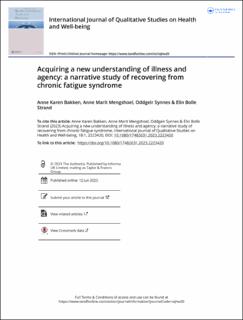| dc.contributor.author | Bakken, Anne Karen | |
| dc.contributor.author | Mengshoel, Anne Marit | |
| dc.contributor.author | Synnes, Oddgeir | |
| dc.contributor.author | Strand, Elin Bolle | |
| dc.date.accessioned | 2023-06-16T07:34:28Z | |
| dc.date.available | 2023-06-16T07:34:28Z | |
| dc.date.created | 2023-06-15T11:17:16Z | |
| dc.date.issued | 2023 | |
| dc.identifier.citation | International Journal of Qualitative Studies on Health and Well-being. 2023, 18 (1), 2223420-?. | en_US |
| dc.identifier.issn | 1748-2623 | |
| dc.identifier.uri | https://hdl.handle.net/11250/3071718 | |
| dc.description | This is an Open Access article distributed under the terms of the Creative Commons Attribution License (http://creativecommons.org/licenses/by/4.0/), which permits unrestricted use, distribution, and reproduction in any medium, provided the original work is properly cited. The terms on which this article has been published allow the posting of the Accepted Manuscript in a repository by the author(s) or with their consent. | en_US |
| dc.description.abstract | Background: The condition known as chronic fatigue syndrome or myalgic encephalomyelitis (CFS/ME) is poorly understood. Simplified medical models tend to neglect the complexity of illness, contributing to a terrain of uncertainty, dilemmas and predicaments. However, despite pessimistic pictures of no cure and poor prognosis, some patients recover.
Purpose: This study’s purpose is to provide insight into people’s experiences of suffering and recovery from very severe CFS/ME and illuminate understanding of how and why changes became possible.
Methods: Fourteen former patients were interviewed about their experiences of returning to health. A narrative analysis was undertaken to explore participants’ experiences and understandings. We present the result through one participant’s story.
Results: The analysis yielded a common plotline with a distinct turning point. Participants went through a profound narrative shift, change in mindset and subsequent long-time work to actively pursue their own healing. Their narrative understandings of being helpless victims of disease were replaced by a more complex view of causality and illness and a new sense of self-agency developed.
Discussion: We discuss the illness narratives in relation to the disease model and its shortcomings, the different voices dominating the stories at different times in a clinically, conceptually, and emotionally challenging area. | en_US |
| dc.language.iso | eng | en_US |
| dc.publisher | Taylor & Francis | en_US |
| dc.rights | Navngivelse 4.0 Internasjonal | * |
| dc.rights.uri | http://creativecommons.org/licenses/by/4.0/deed.no | * |
| dc.subject | persistent physical symptoms | en_US |
| dc.subject | personal experiences | en_US |
| dc.subject | contested diagnose | en_US |
| dc.subject | qualitative interviews | en_US |
| dc.subject | very severe CFS/ME | en_US |
| dc.subject | narrative analysis | en_US |
| dc.subject | illness narratives | en_US |
| dc.subject | recovery process | en_US |
| dc.title | Acquiring a new understanding of illness and agency: a narrative study of recovering from chronic fatigue syndrome | en_US |
| dc.type | Peer reviewed | en_US |
| dc.type | Journal article | en_US |
| dc.description.version | publishedVersion | en_US |
| dc.rights.holder | © 2023 The Author(s). Published by Informa UK Limited, trading as Taylor & Francis Group | en_US |
| dc.source.pagenumber | 1-18 | en_US |
| dc.source.volume | 18 | en_US |
| dc.source.journal | International Journal of Qualitative Studies on Health and Well-being | en_US |
| dc.source.issue | 1 | en_US |
| dc.identifier.doi | doi.org/10.1080/17482631.2023.2223420 | |
| dc.identifier.cristin | 2154802 | |
| cristin.ispublished | true | |
| cristin.fulltext | original | |
| cristin.qualitycode | 1 | |

